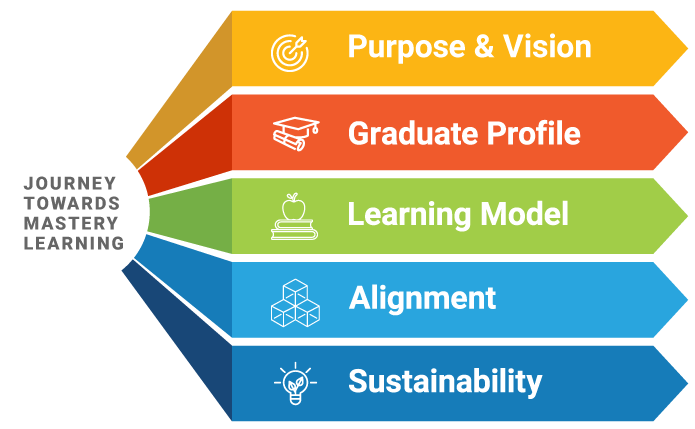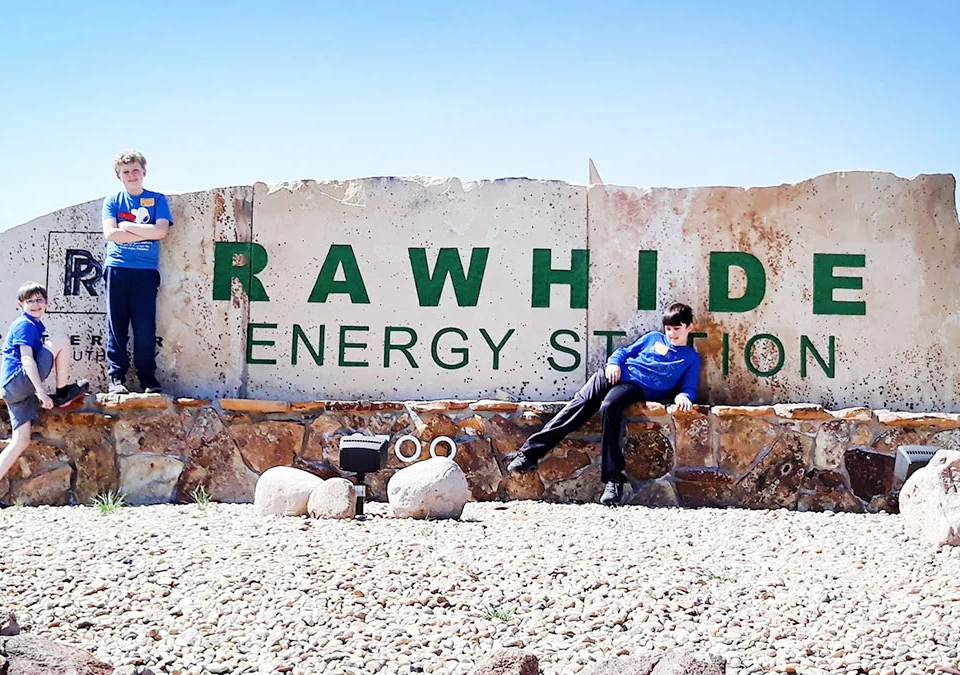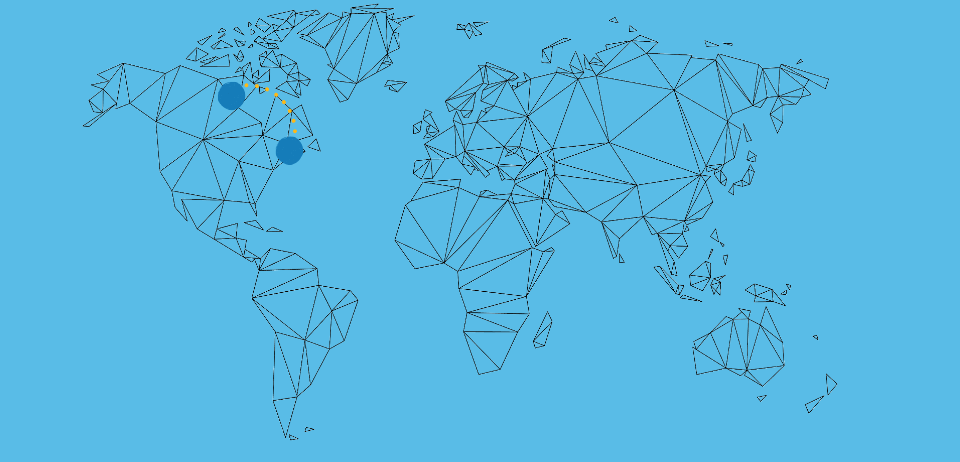Already a member? Log in to the Member Site at members.mastery.org.

MTC and Challenge Success Partner
July 18, 2019
Higher Ed Update: NACAC, Pilots Launching & More
September 23, 2019MTC Offers Journey towards Mastery Learning Courses to Members


Five, distinct courses will run from October through April and are designed to meet schools where they are.
MTC is pleased to offer to member schools, in partnership with Global Online Academy (GOA), the Journeys towards Mastery Learning Series, a set of five week-long online courses that are designed to introduce members to five, common phases of school change. Based on the experience of educators, MTC has identified a common set of preliminary design phases that schools will navigate on the way to mastery learning. Understanding these phases can help demystify the process and encourage schools to start, continue, or reorient along the way. It can help schools understand where they are in the journey, where they are headed, and if there are stages of work where they can return or reengage to overcome challenges or stuck points in their process.
Created for teachers, school leaders, and other community members interested in leading this work at their schools, each course is entirely asynchronous and interactive, meaning participants engage in resources, discussions, and activities on their own schedules. A learning design coach from GOA will facilitate discussions and course activities. All those who enroll in these courses will also receive an invitation to join the MTC’s online member community, a hub for ongoing conversation about these important ideas.
Participants can take as many courses as they like, in any order. Each course includes a panel discussion of experts and educators pursuing mastery learning, a playlist of research and relevant resources, discussion spaces for sharing work and ideas, and practical activities designed for participants to take action on key ideas at their schools. Participants will spend four to six hours working on each course, which includes participation in class discussions, studying key resources, and sharing coursework with colleagues. The courses will run from October 2019 to April 2020.
Course 1
Purpose and Vision: Define a Compelling Reason to Innovate
October 21-25, 2019
$50.00
Districts and schools start on the journey towards mastery learning for different reasons and with different capacities, but all good mastery design starts with a clear “why.” Perhaps schools are trying to unleash innovation. Perhaps they are concerned about the stress students are experiencing when caught up in chasing points rather than developing a sense of purpose and a love of learning. Perhaps they are addressing persistent opportunity and achievement gaps. Perhaps they are frustrated that in spite of offering real-world project-based learning, college admissions force them to retrofit that learning into a list of academic courses and A-F grades. Or, they have invested in building a competency-based system only to find that parents, teachers, and students still rely on their GPA as an indicator of success.
In this course, participants clarify their “why” and articulate a compelling vision for change. Using the Public Narrative Framework developed by Marshall Ganz of Harvard University, participants articulate the values that should drive change, develop a clear call to action, and envision what the future of their communities will look like. Along the way, we discuss why and how elevating the voices of stakeholders from across our communities is a critical element of defining purpose.
REGISTER NOWCourse 2
Graduate Profile: Define Success for All Learners
November 18-22, 2019
$50.00
Mastery learning schools recognize that students will need a broad set of knowledge, skills and dispositions to succeed, and that all students are capable of demonstrating these competencies with the right supports. In this paradigm, the graduate profile is the north star: it articulates the knowledge and skills that students will need not only to graduate from high school, but also to thrive in college and career. This is a departure from the traditional system, where graduation requirements are limited to satisfactory completion of course requirements, as dictated by a district and informed by college admissions. Mastery learning schools embrace bolder expectations for students, and all other design elements flow from this vision of success.
In this course, participants learn the core concepts and elements that define graduate profiles. By exploring examples of graduate profiles and hearing from MTC members who have already developed their own, participants develop a community-oriented action plan for designing their own graduate profiles and a common learning framework that aligns learning expectations (including mastery credits) to those Profiles.
REGISTER NOWCourse 3
Learning Model: Define How Learning and Teaching Will Change
January 13-17, 2020
$50.00
Mastery learning schools have instructional approaches and systems of assessments that are based on the learning sciences. Research on learning emphasizes learner agency and ownership. Agency is not an abstract concept, it is a set of skills that students develop over time including self-regulation and meta-cognition. The research on learning also calls for authentic engagement and intrinsic motivation, social emotional wellness and relational support, attention to information processing and memory, and cultural competency. In addition, mastery learning is oriented toward deeper learning by emphasizing the application and transfer of knowledge and skills through project-based, inquiry-based, expeditionary, and real-world learning. The systems of assessment are fully aligned so that students receive productive feedback and opportunity to show what they know through performance tasks and performance-based assessment.
In this course, participants explore resources and strategies on designing mastery learning environments. Participants discuss examples from a variety of schools, and practice writing mastery credits and designing learning experiences aligned to them.
REGISTER NOWCourse 4
Alignment: Ensuring Culture and Structures Support Mastery Learning
February 10-14, 2020
$50.00
Ensuring all students advance to mastery means creating strong systems and structures for providing each student with the right support at the right time. This requires data to know where students are and how they are progressing, flexibility to adjust instruction and supports, and adequate resources to match students’ needs. Mastery learning schools run on transparency: the powerful commitment to ensure that teachers, students, and families know where students are in their learning and what they need to do to progress. Mastery schools don’t just give lip service about equity, they put systems and structures in place to create it. They nurture inclusive school culture. They create greater organizational flexibility to respond to students so that they can be successful in light of their past educational experiences and future goals. This might mean addressing inequitable resource allocation and working with staff to mitigate personal and institutional bias, diversifying staff and leadership, or developing systems that ensure all students can access rigorous and engaging learning wherever they are on their path to mastery.
This course focuses on the elements of school beyond the classroom that must change to support mastery learning. Using a case study approach, participants have a chance to explore how a variety of mastery-based schools are designed in terms of time, space, grading and reporting, and human resources. Discussions and course activities will focus on analyzing these case studies and considering how their approaches might (not) apply to our own communities. Participants have the opportunity to design a strategy for structural change that aligns to their own missions and contexts. Designed for educators who are leading the work of redesigning systems and structures at their schools.
REGISTER NOWCourse 5
Sustainability: Building Capacity to Sustain Change Over Time
March 30-April 3, 2020
$50.00
The shift to mastery learning a multiyear endeavor, and a change process that saps energy at the outset will not stand the test of time. The two most vital aspects of sustainability are capacity building and effective implementation. Typically, capacity building for teachers starts with strong professional learning communities and includes effective instructional design, calibration on mastery credits, and assessment literacy. An enduring student-centered approach requires organizational flexibility and strong systems of continuous improvement. Effective implementation means phased, thoughtful, and iterative implementation. All pieces of the system cannot be put in place at once, so it is important to articulate implementation priorities over time, charting the path ahead. Often, schools find that elements of culture and common instructional practices are the most important things to get right early on.
In this course we focus on the skills school leaders need to nurture long-term change. We focus on the leadership framework from Global Online Academy’s Competency-Based Learning Toolkit—Vision, Research, Communication, and Support—with opportunities for participants to select areas most relevant to their work and design strategies for implementation. Discussion and course activities focus on practical strategies for both long-term planning and immediate introduction of mastery learning to school communities.
REGISTER NOWFor more information and to register, please visit https://goa.force.com/mtccatalog.
About Mastery Transcript Consortium (MTC)
The Mastery Transcript Consortium™ (MTC) is made up of a growing network of public and private member high schools who have created the Mastery Transcript, a high school transcript that supports mastery learning and reflects the unique skills, strengths, and interests of each learner. In the coming years, the MTC hopes to change the way students prepare for college, career, and life.
About Global Online Academy (GOA)
Global Online Academy is a nonprofit organization that reimagines learning to empower students and educators to thrive in a globally networked society.




